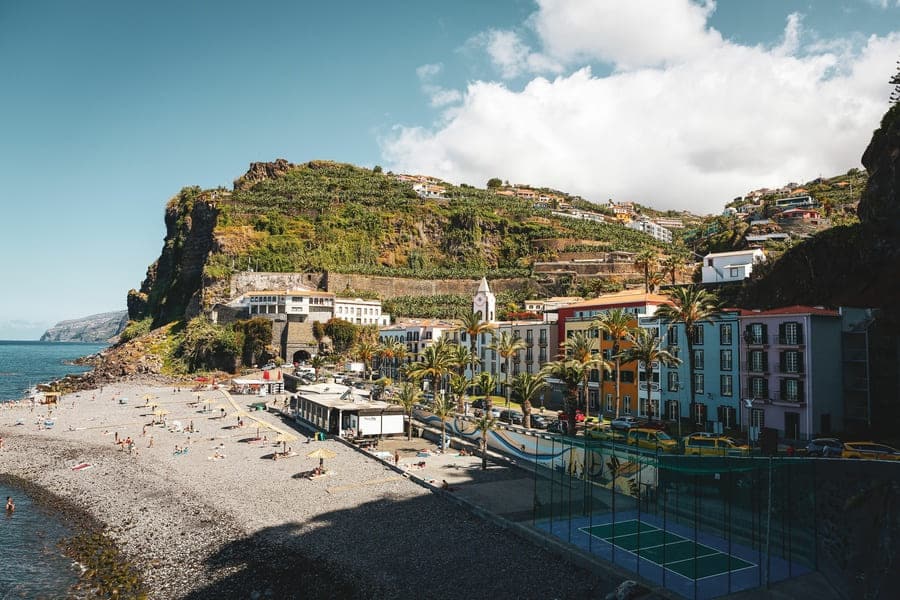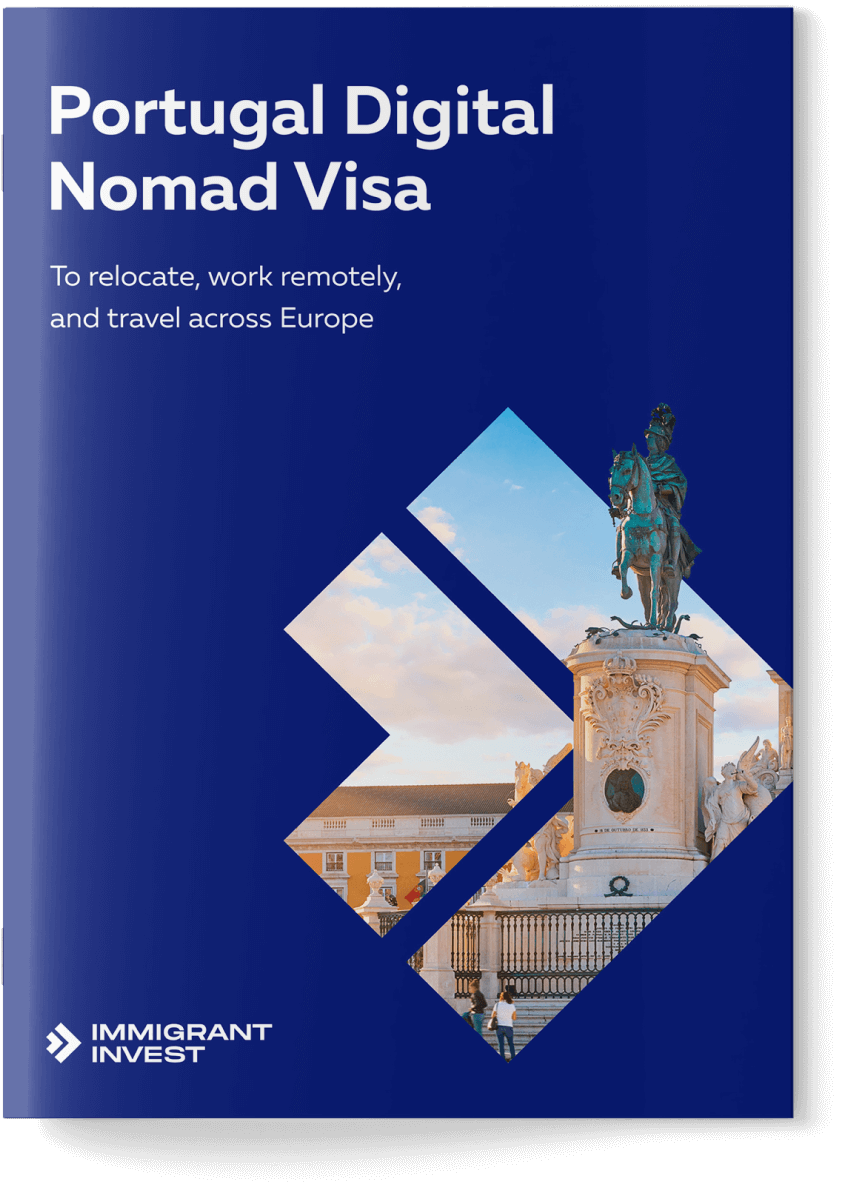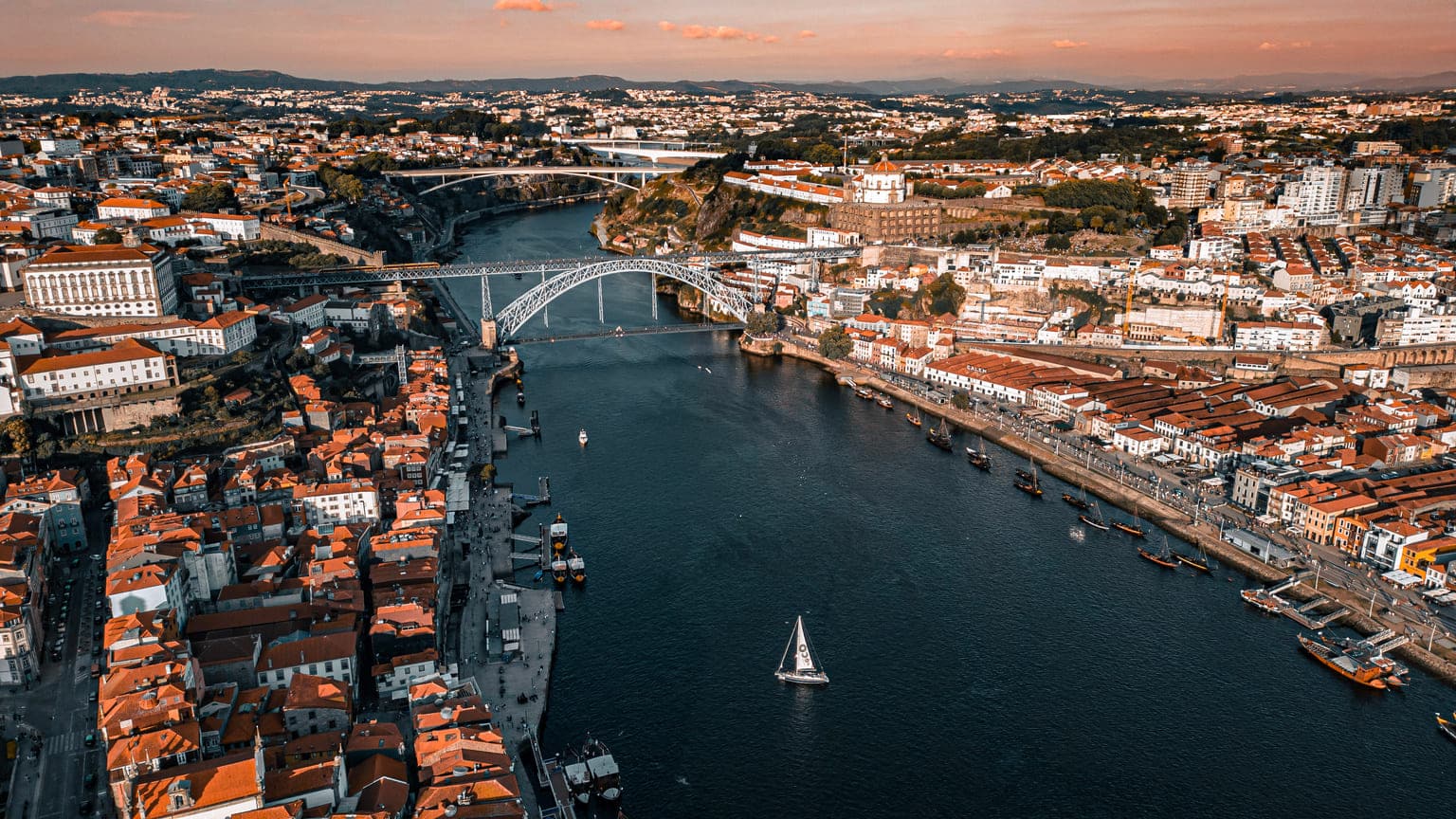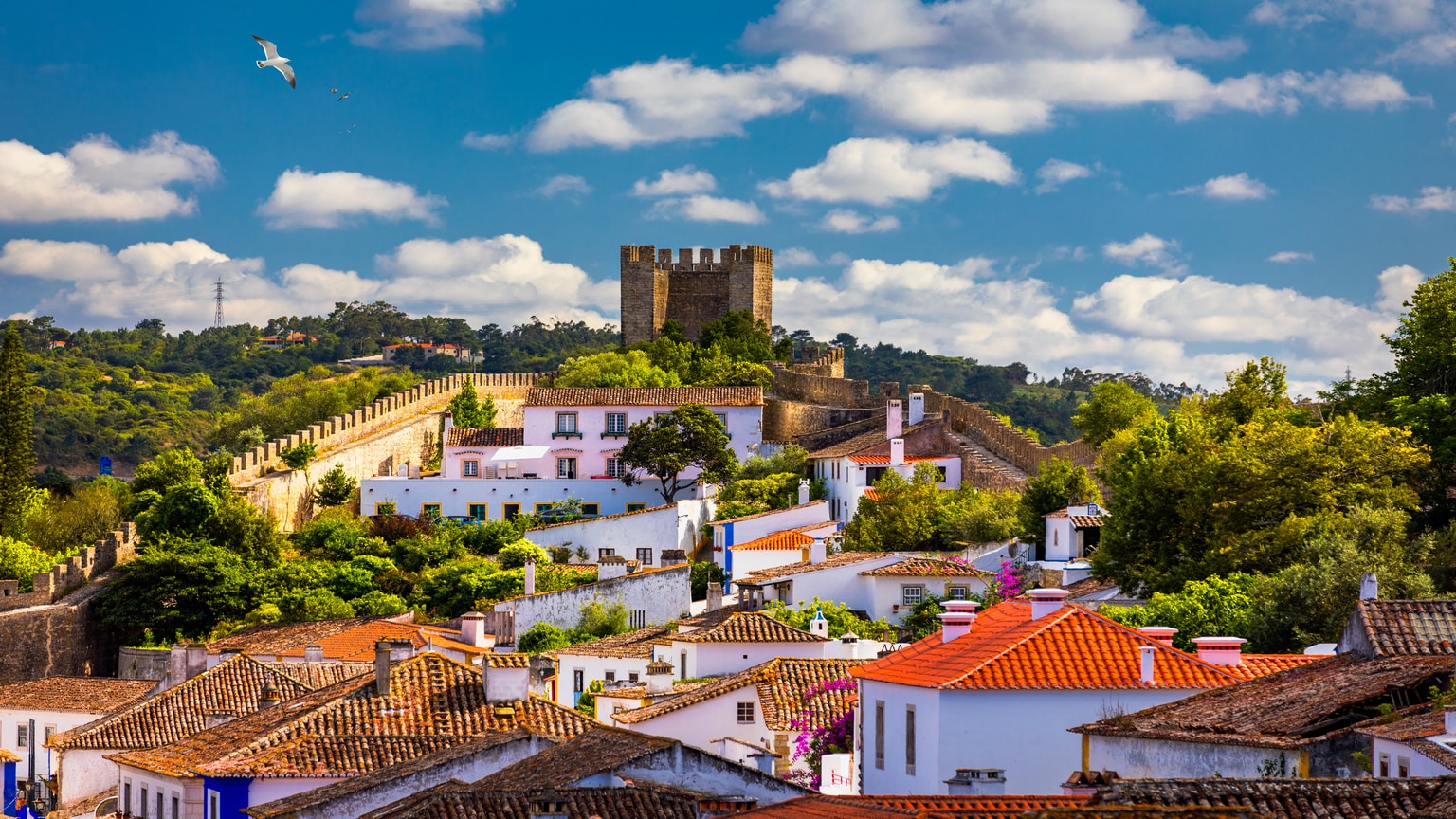What is a Portugal Digital Nomad Visa
The Portugal Digital Nomad Visa is a national type D visa that allows its holder to reside in the country for at least a year. It is intended for freelancers and remote workers with a monthly income of at least €3,280. This visa suits professionals looking to move to a nomad-friendly place, live by the ocean and meet like-minded people.
As a national visa to Portugal, the Digital Nomad Visa comes in two forms:
- long-term, or residency visa, is a two-entry visa that is valid for 4 months and allows obtaining a 2-year residence permit upon arrival to Portugal;
- temporary stay visa, valid for 1 year and allows multiple entry to the country but does not give the right to claim a residency permit.
The procedure for obtaining both visas is similar and requires the same documents. The only difference is that a long-term visa holder has to visit the Immigration and Borders Service upon arrival in Portugal and apply for a residence permit before the visa expires. This is not necessary for temporary residents.
3 key benefits of the Digital Nomad Visa
1. Right to reside in Portugal. The Digital Nomad Visa allows its holder to live in Portugal for at least a year. To compare, a tourist visa allows a person to stay in the country for up to 90 days every six months.
2. Relatively low-cost and low-effort. Unlike most national visas to Portugal, the Digital Nomad Visa requires the applicant only to show sufficient income and the ability to work remotely. The applicant does not need to find an employer in Portugal, enrol in a study or start a business.
3. Prospect of EU citizenship and visa-free travel across Europe. Portugal is a part of the Schengen area, meaning the country’s residents can freely travel to other state members. This applies to short visits up to 90 days every 6 months, which is plenty enough for an occasional change of location and weekend getaways.
Digital nomads can obtain a Portugal passport if they spend more than 5 years in the country and integrate with the local culture. Before applying for citizenship, they must take a Portuguese proficiency exam and prove they know the language at the A2 level or higher.
Requirements: who can get Digital Nomad Visa to Portugal
The main requirements for Digital Nomad Visa applicants include the following:
- age over 18 years old;
- citizenship in non-EU and non-EEA countries;
- fully remote work on a permanent contract or freelance;
- total income from all sources of at least €3,280;
- arranged accommodation in Portugal with at least 1-year extended agreement for rented properties.
A digital nomad obtaining the visa can invite their close family members to get it to Portugal. This applies to applicants’ spouses, children under 18 and parents over 65 or younger, if they are financially dependent on the main applicant. It is possible to also include children from 18 to 30 years old, with the conditions that they are unmarried and financially dependent on their applicant parent.
Each adult family member fills in their application form for an accompanying visa and arranges an appointment at the consulate.
Costs for obtaining Portugal Digital Nomad Visa
To obtain a Digital Nomad Visa, an applicant must prove that their monthly income exceeded the threshold of €3,280. Aside from that, they must provide a bank statement with at least 12 Portugal’s minimal salaries on balance. In 2024, that amount equals €9,840.
If digital nomads want to add family members to their visa application, they must show sufficient savings: an extra €2,460 per underaged family member and an additional €4,920 per adult. For example, demonstrated savings of an applicant when including a spouse and a ten-year-old child in the application should be at least €17,220.
When submitting the documents for the visa, the candidate pays an application fee. The amount depends on the type of visa they request:
- €75 — for a temporary stay visa;
- €90 — for a long-term visa that provides residency.
Other expenses associated with the Digital Nomad Visa include medical insurance payments and rent. Private health insurance costs €20—100 monthly, depending on the package. People who apply for a long-term visa can switch to Portugal’s public healthcare package once they obtain their permit.
People pay around €800 for a one-bedroom flat in the city centre on average for rent. Typically, in large cities like Porto, tenants pay 10% more. In Lisbon, the rent is almost double the country’s average.
Documents required for a Digital Nomad Visa to Portugal
To apply for a national visa to Portugal, foreigners collect a standard package of documents proving their identity, financial means and the grounds to get the visa. The consulate may request additional records.
The standard package includes the following papers:
- A valid passport.
- Two passport photos, 4.5 x 3.5 in size.
- Documents proving the remote employment status: a contract or partnership agreement.
- A bank statement confirming the applicant’s monthly income of at least €3,280.
- A bank statement with at least €9,840 on balance.
- Tax return ticket or tax receipt.
- A letter explaining the candidate’s motivation to move to Portugal, written in English.
- Tickets to Portugal.
- A certificate of no criminal record with apostille, translated to Portuguese.
- A rental agreement in Portugal or a certificate of real estate ownership.
- Health insurance is valid in Portugal.
Step-by-step procedure for obtaining Digital Nomad Visa
Foreigners apply for Digital Nomad Visas to a Portugal consulate of their country of citizenship or official residence. The process usually takes 2—3 months. It is also possible to apply for a Digital Nomad Visa from Portugal, but the processing will take around 2 years, during which the applicant cannot leave the state.
Here’s how the process goes when applying outside Portugal for a long-term visa.
A digital nomad collects their papers, submits them to a Portuguese consulate, and pays the processing fee.
The application is processed in 60 days. If approved, the visa is stamped in the applicant’s passport. The consulate also sets an appointment with AIMA, the Agency for Integration, Migration and Asylum of Portugal, for the applicant to claim their residency permit once they arrive in Portugal.
At AIMA, the visa holder submits the same package of documents and pays a processing fee of €170.
The processing of a residency application takes from 2 to 12 weeks. The digital nomad receives it by post.
Do digital nomads pay taxes in Portugal?
The type of visa one uses to enter Portugal does not determine their tax obligations in the country. What determines their obligations is their tax residency status.
A person becomes a tax resident of Portugal if they spend more than 183 days a year within the country. The income tax rate in Portugal is 14—48%, depending on the income. Before 2024, digital nomad could apply for the Non-habitual Resident (NHR) status that provides reduced tax rates for 10 years.
Digital nomads with an NHR status use to pay taxes on income from abroad and pay a flat rate of 20% on income from within Portugal instead of the potential 48%. However, this opportunity is no longer available for new residents as of 2024.
Why expats and remote workers choose Portugal
Around 7% of Portugal’s population are expats, and since 2015, the number of foreign residents in the country has been consistently growing. Above that, Lisbon is recognized as the best city for digital nomads in the ranking by Instant Offices. There are many reasons people from all over the world choose Portugal as their new place of residence.
Relatively low cost of living. According to Eurostat’s study, the average cost of living in Portugal is lower than in Europe. Life in Portugal is more affordable than in Spain, Italy, and Estonia. Prices on consumer goods, such as groceries and clothing, are comparable to those in Slovenia, Greece, and Cyprus.
Universal healthcare. Residents in Portugal, including expats, can take advantage of public healthcare. Depending on the type of medical service, it comes either for free or at a low cost of around €5—10. State-provided healthcare is free for pregnant women, children and pensioners.
Perfect climate. With sunny days and the fresh breeze from the Atlantic, Portugal boasts nice weather all year round. Summers are hot and dry, with the peak temperature around 29 °C in Lisbon and 26 °C in the northern regions. Winters are rainy and warm, with an average temperature of around 15—16 °C.
Strong community and developed infrastructure for digital nomads. Portugal is the first country in Europe to have a Digital Nomad Village — a unique community where location-independent professionals can find like-minded people, network and organise events.
Big cities in Portugal, such as Lisbon and Porto, provide fast, accessible Wi-Fi in public spaces and an extensive selection of modern coworking spaces.
Laid back lifestyle. Portuguese prefer to have a relaxed pace of life with short working hours and midday siestas. Such an environment makes it much easier for digital nomads to drop a work-centric mindset and fix their work-life balance.
Plenty of options for active leisure. Portugal is a place for busy people looking for new experiences and wishing to try exciting sports, such as surfing, windsurfing, scuba diving, sailing, etc. Aside from that, the country offers world-class leisure complexes providing places and equipment for gold, tennis, and other sports.

Drawbacks of living in Portugal
There are aspects of life in Portugal that many expats find challenging to adapt to. Mainly, the complaints refer to bureaucracy, the necessity to always carry cash with you, and the lack of central heating.
Bureaucracy and long waiting times. Paperwork in Portugal can be frustrating: people complain that errands like renewing a residence permit take longer than expected. Aside from that, it can also be unclear what documents are required for a particular procedure, as different departments have different requirements for the same operation.
It’s not always possible to pay with a card. Cards are often not accepted in small shops and bars. Moreover, even some big supermarket chains don’t take cards if the check is less than €20.
No central heating. Even though winters in Portugal are relatively warm, it can get cold enough in December and January for people to turn on the heating in their houses. Since there is no central heating in the country, residents use electric radiators, which leads to substantial utility bills.
Cities to live in Portugal as a digital nomad
Lisbon is recognised as the most convenient city for digital nomads worldwide. As the capital of Portugal, it offers the most developed infrastructure in the country, vibrant cultural life, accessible Wi-Fi almost anywhere, and plenty of coworking spaces to choose from. However, the rental prices here are high compared to other cities. Also, it does not have a beach nearby.
The capital is a great place for digital nomads looking to live in a big city and enjoy an active social life, the convenience of developed infrastructure and the variety of vibrant bars and restaurants.
Porto, the second largest city in Portugal, is also an excellent choice for expats. There are beaches on the city outskirts, and prices here are lower. Meanwhile, public Wi-Fi is also widely available. Compared to Lisbon, Porto does have a calmer cultural life and fewer coworking spaces.
Porto would suit those who want to live a 15-minute bus ride away from the ocean but are unwilling to move to a small coastal town.
Lagos is a cosy beach town in the south of Portugal. Recently, it started gaining popularity among digital nomads moving to Portugal. Lagos has comfortable conditions for remote workers with its newly opened coworking spaces. Aside from that, it attracts expats with its serene atmosphere and beautiful beaches. This is the place for people looking for a slower, more relaxed pace of life.
Madeira. The island of Madeira is one of the hubs for digital nomads, where the local government actively invites expats to move to. The town of Ponta Do Sol was transformed into a Digital Nomad Village with a free coworking space in the centre of it. The work of hotels, co-living spaces and car rentals has been optimised for long-term foreign residents. The town regularly organises networking events and parties for expats.
Funchal, the island’s capital, is also a great place for digital nomads. It provides more of a city-life experience while still having all the necessary infrastructure for remote workers. Any options to reside in Madeira would suit those looking to join a community of like-minded digital nomads.

Portugal Digital Nomad Visa alternatives
D7 visa for financially independent individuals. The D7 visa enables foreigners with stable passive income to become residents in Portugal. The minimum income required for the visa is €820 — it could be rental income, pensions, royalties, and other types of legal income received remotely. The applicant for the D7 visa also has to show arranged accommodation in Portugal and have an account in a local bank.
D7 applicants can provide their close family members with residence permits as well. This applies to spouses, dependent children and parents.
Before Portugal started issuing the Digital Nomad Visa, the passive income visa was the go-to option for remote workers. But now they are expected to apply for a special visa.
The Startup visa is intended for foreign entrepreneurs willing to start an innovative business in Portugal. A candidate must have an innovative project idea to get such a visa. Applicants enrolled in a licenced business incubator develop a business plan and then submit their application to IAPMEI, the Portuguese Agency for Competitiveness and Innovation.
Applicants for the startup visa are not required to invest any minimum amount in their project. But they do need to show sufficient funds for life in Portugal. Along with their application form, candidates submit a bank statement with at least €6,200, a motivational letter and a CV.
Business visa, or D2, is a different visa for entrepreneurs looking to start a project in Portugal. This one does not require the project to be innovative.
Applicants for the D2 visa can either start a new business or purchase an existing one. Aside from the business documentation that includes the business plan and founding papers, candidates must show a lease agreement for a property in Portugal.
Digital Nomad Visa to Portugal: key takeaways
1. The Digital Nomad Visa allows foreign remote workers and freelancers who earn more than €3,280 per month to reside in Portugal. When submitting documents, applicants must show proof of income and a bank statement with at least €9,840 on balance.
2. The Digital Nomad Visa is a national visa and comes in two forms. The temporary stay visa is valid for 1 year and allows multiple entry to Portugal, while the long-term visa is valid for 4 months and allows obtaining 2-year residency. The required documents and the obtainment process are similar for both visas.
3. It takes around 3 months to obtain a Digital Nomad Visa.
4. Digital Nomads choose Portugal as a place of residence for its developed infrastructure for online work, laid-back lifestyle, picturesque scenery and a wide variety of leisure activities.
5. Portugal is the first European country to have a unique Digital Nomad Village with a strong community of remote working professionals. The Village is located on the island of Madeira.
6. Other types of visas that allow foreigners to move to Portugal are the Startup visa, the D7 visa for financially independent individuals, and the Business visa.
Frequently asked questions
Yes, Portugal does have a Digital Nomad Visa. It is available to foreigners working remotely and earning more than €3,280 per month.
The Digital Nomad Visa to Portugal is available to non-EU and non-EEA citizens over 18 years old. The applicant must work remotely, earn at least €3,280, and have arranged accommodation in Portugal.
Aside from the monthly income of at least €3,280, applicants must show a bank statement with at least 9,840 on balance.
To submit their application and have it processed, candidates also pay €75—90 depending on the chosen type of visa. Above that, costs for obtaining the Digital Nomad Visa include payments for insurance and rent in Portugal.
One starts paying taxes in Portugal only after they obtain a tax resident status, which happens only if they spend over 183 days a year in the country.
To apply for a Digital Nomad Visa, one must collect the standard documents package, including bank statements, proof of accommodation, and work contracts, and submit them to a Portuguese consulate of their country of citizenship or official residence.
Typically, it takes around 2—3 months to obtain a Digital Nomad Visa to Portugal.
The Digital Nomad Visa allows its holder to stay in Portugal for at least a year. As a national visa, this type of permit comes in two forms:
- temporary stay visa that is valid for 1 year and allows multiple entry to the country;
- long-term visa valid for 4 months and allows only 2 entries to the country — upon arrival to Portugal, it is exchanged for a 2-year residence permit.







